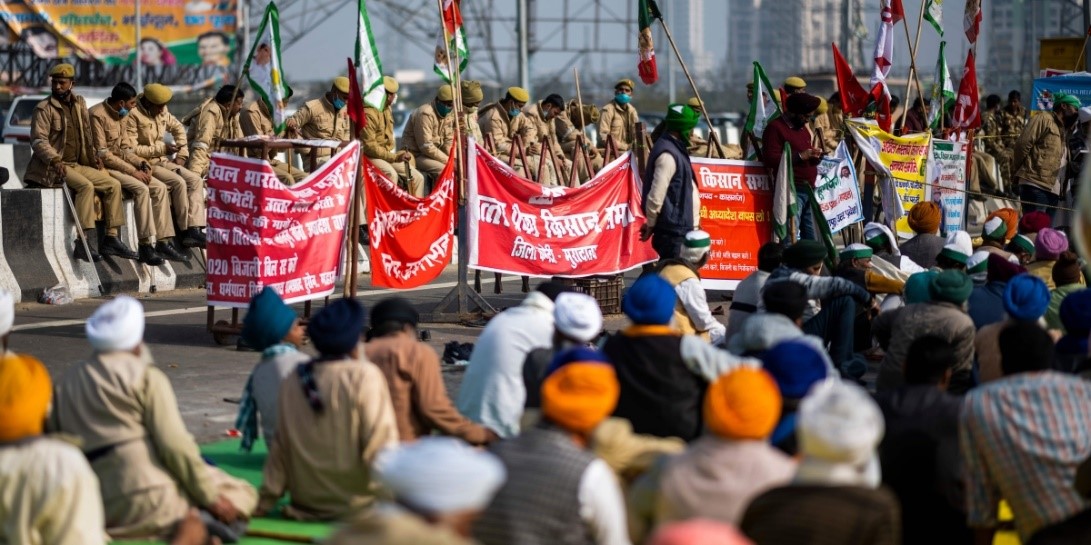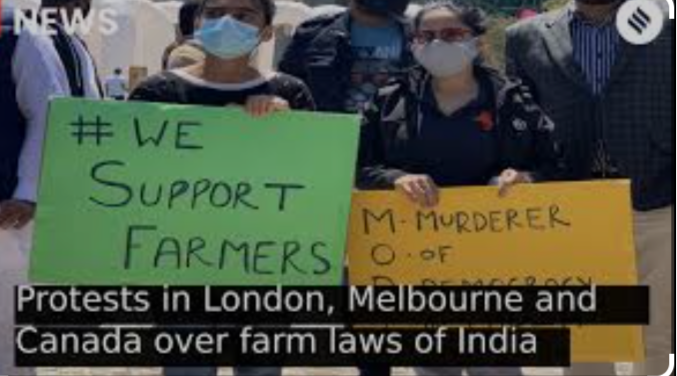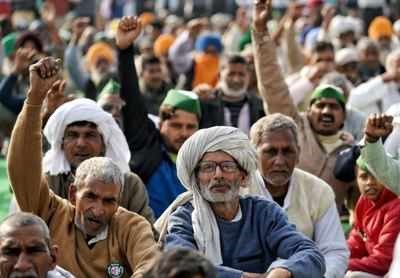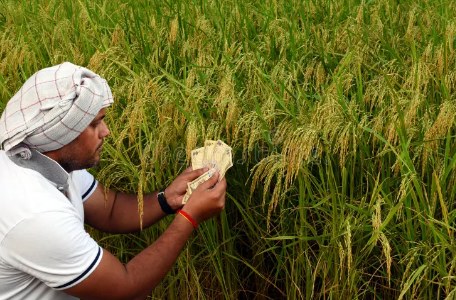The Farmers' Protests: what does it mean today?
Back To Home Posted on: 22/08/2024
The Farmers' Protests in India, which began in late 2020, represent one of the largest mobilizations of farmers in recent history. Sparked by the introduction of three agricultural laws, these protests have brought to the forefront critical issues surrounding agriculture, economics, and governance in India. This blog takes a comprehensive look at the origins, key events, and potential implications of the farmers' protests.
Background: The Agricultural Laws
In September 2020, the Indian government passed three controversial agricultural laws:
The Farmers' Produce Trade and Commerce (Promotion and Facilitation) Act, 2020: This law aimed to create a framework for farmers to sell their produce outside the traditional APMC (Agricultural Produce Market Committee) markets.
The Farmers (Empowerment and Protection) Agreement on Price Assurance and Farm Services Act, 2020: This law provided a framework for contract farming, enabling farmers to enter into agreements with buyers at predetermined prices.
The Essential Commodities (Amendment) Act, 2020: This law aimed to deregulate the production, storage, movement, and distribution of several key commodities.
 While farmers across India protested, the protests were particularly strong in Punjab, Haryana, and western Uttar Pradesh. For the layman, or lay economics observer these protests made no sense as these laws were aimed at liberalizing the agricultural sector by allowing farmers to sell their produce outside government-regulated markets (APMCs) and encouraging private markets. This should have been welcomed but in the given region, farming and state support to farming is critical given the declining stage of the green revolution and the high cost of inputs like electricity, water and fertilisers. Economically, the farmers feared these reforms would weaken the traditional mandi system and the Minimum Support Price (MSP) framework, which provided them with a guaranteed price for crops like wheat and rice. The concern was that without the security of MSP, small and marginal farmers would be left vulnerable to market fluctuations and price manipulation by large corporations. Most importantly, farmers argued that the laws favoured corporatization, which could skew the balance of power in favour of agribusinesses, potentially leading to the exploitation of farmers. Names of big corporate houses, perceived to be close to the government further complicated the matters. Furthermore, reforms that removed stockpiling limits on essential commodities raised fears of price volatility and hoarding, which could destabilize agricultural incomes. Despite government assurances that MSP would remain intact, the economic uncertainty surrounding these changes sparked widespread mistrust.
While farmers across India protested, the protests were particularly strong in Punjab, Haryana, and western Uttar Pradesh. For the layman, or lay economics observer these protests made no sense as these laws were aimed at liberalizing the agricultural sector by allowing farmers to sell their produce outside government-regulated markets (APMCs) and encouraging private markets. This should have been welcomed but in the given region, farming and state support to farming is critical given the declining stage of the green revolution and the high cost of inputs like electricity, water and fertilisers. Economically, the farmers feared these reforms would weaken the traditional mandi system and the Minimum Support Price (MSP) framework, which provided them with a guaranteed price for crops like wheat and rice. The concern was that without the security of MSP, small and marginal farmers would be left vulnerable to market fluctuations and price manipulation by large corporations. Most importantly, farmers argued that the laws favoured corporatization, which could skew the balance of power in favour of agribusinesses, potentially leading to the exploitation of farmers. Names of big corporate houses, perceived to be close to the government further complicated the matters. Furthermore, reforms that removed stockpiling limits on essential commodities raised fears of price volatility and hoarding, which could destabilize agricultural incomes. Despite government assurances that MSP would remain intact, the economic uncertainty surrounding these changes sparked widespread mistrust.

The farmers' protests began in November 2020, when farmers from Punjab and Haryana blocked highways and railways in response to the new farm laws. By the end of the month, thousands of farmers marched towards New Delhi, where they faced clashes with police at various border points. In December 2020, the protests gained momentum as farmer unions from other states joined in, showing nationwide solidarity. A Bharat Bandh (nationwide strike) was held on December 8, drawing support from trade unions, opposition parties, and civil society groups.
In January 2021, the protests reached a peak when farmers organized a tractor rally in Delhi on Republic Day (January 26). Unfortunately, the event turned violent after clashes erupted between protesters and the police, leading to widespread criticism and briefly weakening the movement. Many celebrities, around the world joined the movement and expressed support. Daljit Dosanjh being one of the most prominent of these. Countries like Canada , with large Sikh population also took up the isse. Despite this, the protests continued, and multiple rounds of negotiations were held between the farmers and the government. Although the government offered to suspend the farm laws for 18 months, the farmers stood firm, demanding a full repeal. This led to a prolonged stalemate with no immediate resolution. Ultimately, after a year of persistent protests, the government repealed the laws in December 2021, recognizing the economic anxieties of farmers and their fears of being marginalized in a corporatized market system.
 The farmers’ demand for the complete repeal of the laws was met, ending the immediate phase of the protests.
The farmers’ demand for the complete repeal of the laws was met, ending the immediate phase of the protests.
However, the movement has left a lasting impact. Many farmer unions continue to advocate for other issues, particularly the demand to legally guarantee the Minimum Support Price (MSP) for all crops, which remains unresolved. While the repeal of the laws was a major win for the farmers, they continue to push for broader agricultural reforms to secure stable incomes and prevent corporate exploitation in the sector.
The movement sparked some lasting social and economic Impact. The protests have strengthened the unity among various farmer unions across India, highlighting the collective power of farmers. Prolonged protests have led to economic disruptions, particularly in states like Punjab and Haryana. The blockades and strikes have affected supply chains and market dynamics. The impact of this could be seen in the recent Lok Sabha elections also. The protests have put significant pressure on the central government, impacting its political capital and leading to a re-evaluation of its approach to agricultural reform. The protests have also triggered a broader debate on agricultural policy in India, emphasizing the need for reforms that balance the interests of farmers with economic growth.

However, the movement has left a lasting impact. Many farmer unions continue to advocate for other issues, particularly the demand to legally guarantee the Minimum Support Price (MSP) for all crops, which remains unresolved. While the repeal of the laws was a major win for the farmers, they continue to push for broader agricultural reforms to secure stable incomes and prevent corporate exploitation in the sector.
 The Farmers' Protests in India have brought to light critical issues concerning agriculture, governance, and economic policy. As the country navigates this complex landscape, the lessons learned from these protests could shape the future of agricultural reforms and democratic engagement in India. The ongoing dialogue and negotiations will be crucial in determining a path forward that ensures the welfare and prosperity of farmers while fostering sustainable economic development. There is no doubt that reforms in agricultural sector are needed and that these need to focus on providing farmers with better support and access to markets. Strengthening infrastructure for storage and transport, and encouraging crop diversification, promoting sustainable farming practices, and using technology can help farmers grow and sell more efficiently. Overall, reforms should aim to secure stable incomes for farmers while making farming more efficient and environmentally friendlyThe Farmers' Protests in India have brought to light critical issues concerning agriculture, governance, and economic policy. As the country navigates this complex landscape, the lessons learned from these protests could shape the future of agricultural reforms and democratic engagement in India. The ongoing dialogue and negotiations will be crucial in determining a path forward that ensures the welfare and prosperity of farmers while fostering sustainable economic development. There is no doubt that reforms in agricultural sector are needed and that these need to focus on providing farmers with better support and access to markets. Strengthening infrastructure for storage and transport, and encouraging crop diversification, promoting sustainable farming practices, and using technology can help farmers grow and sell more efficiently. Overall, reforms should aim to secure stable incomes for farmers while making farming more efficient and environmentally friendly
The Farmers' Protests in India have brought to light critical issues concerning agriculture, governance, and economic policy. As the country navigates this complex landscape, the lessons learned from these protests could shape the future of agricultural reforms and democratic engagement in India. The ongoing dialogue and negotiations will be crucial in determining a path forward that ensures the welfare and prosperity of farmers while fostering sustainable economic development. There is no doubt that reforms in agricultural sector are needed and that these need to focus on providing farmers with better support and access to markets. Strengthening infrastructure for storage and transport, and encouraging crop diversification, promoting sustainable farming practices, and using technology can help farmers grow and sell more efficiently. Overall, reforms should aim to secure stable incomes for farmers while making farming more efficient and environmentally friendlyThe Farmers' Protests in India have brought to light critical issues concerning agriculture, governance, and economic policy. As the country navigates this complex landscape, the lessons learned from these protests could shape the future of agricultural reforms and democratic engagement in India. The ongoing dialogue and negotiations will be crucial in determining a path forward that ensures the welfare and prosperity of farmers while fostering sustainable economic development. There is no doubt that reforms in agricultural sector are needed and that these need to focus on providing farmers with better support and access to markets. Strengthening infrastructure for storage and transport, and encouraging crop diversification, promoting sustainable farming practices, and using technology can help farmers grow and sell more efficiently. Overall, reforms should aim to secure stable incomes for farmers while making farming more efficient and environmentally friendly